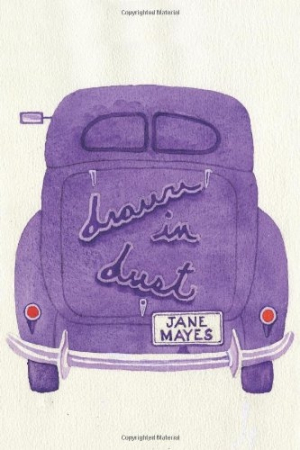Drawn in Dust
Poets write about subjects that touch their hearts. The more universal this emotion, the wider the audience it inspires. Jane Mayes identifies poetry as the language of feelings in one of the concluding poems of her book, Drawn in Dust. A poet who cares deeply about her subject matter, she observes and chronicles her feelings about childhood, family, neighbors, relationships, death, and recovery after loss. Her poetic style encompasses blank and narrative verse, and she uses rhyme and meter to highlight imagery. Metaphor, irony, and quirky characterizations add specificity to her poems’ meanings.
Mayes, who is based in southeastern Michigan, studied English and French in college and earned a master’s degree in school librarianship. A retired teacher and librarian, she concentrates on writing poetry and memoir. Her work has appeared in numerous journals and anthologies, and she received the Michigan Poetry Society’s 2010 traveling trophy.
Drawings by Don Bullis illustrate the book’s front and back covers, the frontispiece, and the section dividers.
The brief poem “Gifts” may seem to lack substance until the reader begins to absorb the meaning of its last few lines. Anyone who has received a gift and then felt unduly obligated to the gift giver will understand this poem’s stinging power: “wrapped in satiny ribbons / festooned with balloons / or curly-cue bows / colorful strings attached / some almost invisible / spider filaments / designed to ensnare.”
Mayes uses humorous irony to good effect. “In My Perfect World … ,” she imagines a utopia where all politicians work for the common good and no one suffers from hunger. She concludes the poem with these imaginings: “toads will be recognized as the princes they are / peeling onions will be the only cause to cry / intestinal gas will be like pleasant perfume and / people will all be a lovely shade of golden tan.”
Mayes’ section devoted to love poems describes the solid connection she and her husband felt for one another during their long relationship. These poems prepare readers for the next section, which focuses on loss. Following the final illness and death of her husband, Mayes attempts to adjust to her fears about the transience of life. She struggles to overcome thoughts of death that persist in haunting her. In “Another Fine Afternoon,” halfway through yet another day, she gains enough perspective to see the day’s beauty: “I’ve won the race past the cemetery gates / and sinister morning statistics / to another fine afternoon.”
Mayes writes sensitively about experiences that cover a lifetime, in most instances to good effect. However, her poems of protest about injustices she feels strongly about—man’s inhumanity to man, hunger, war, and abuse of power—lack subjective impact.
Overall, this book reveals a poet who cares deeply about life and deserves to be widely read.
Reviewed by
Margaret Cullison
Disclosure: This article is not an endorsement, but a review. The publisher of this book provided free copies of the book and paid a small fee to have their book reviewed by a professional reviewer. Foreword Reviews and Clarion Reviews make no guarantee that the publisher will receive a positive review. Foreword Magazine, Inc. is disclosing this in accordance with the Federal Trade Commission’s 16 CFR, Part 255.

